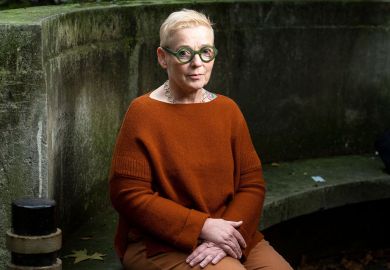When I was starting my academic career at the UK’s Open University (OU), feminism was against the determinism of biological sex as the defining force in identity. The malleable influences of gender and culture were emphasised instead.
So it seems odd that gender-critical feminists such as Jo Phoenix now insist on its primacy. But there are reasons for this apparent reversal. And even if colleagues don’t agree with them, harassment, victimisation and discrimination ought not to be their reaction.
As transgender activism has gained momentum, cisgender women have become increasingly concerned about women’s and girls’ safety in spaces such as toilets and workplaces. Over decades, women have fought against toxic masculinity and sexual harassment. They have united around the common experiences of biological women: menstruation, pregnancy, childbirth and menopause. And they fear that highly publicised incidents, such as the male rapist placed in a Scottish women’s prison after self-identifying as female, are just the tip of the iceberg.
But people who identify as transgender have compelling human rights too. A 2022 Canadian study found that transgender adolescents were 7.6 times more likely to attempt suicide than their cisgender peers. Transgender youth disproportionately suffer from bullying, loneliness and mental health problems, including self-harming, anxiety and rejection. People with transgender identities aren’t taking a cheap ticket away from “normal” life.
Adopting only that second human rights position, numerous OU faculty made Phoenix’s life so difficult that she felt compelled to resign – a “hostile environment” from which the university was criticised for failing to protect her in an employment tribunal ruling last month.
Women’s and transgender rights are just one spiky cultural controversy in our educational institutions. Whether it’s islamophobia v antisemitism, immigration v national identity, or religious freedom v homophobia and patriarchal oppression, we are being drawn into conflicts that seem almost irreconcilable. And it isn’t just the OU that is finding it hard to navigate such terrain. In my opinion, most universities are responding in utterly dysfunctional ways.
Two-thirds of US higher education institutions, for example, now offer anti-bias training. Yet an extensive review has concluded that such training “doesn’t reduce bias, alter behaviour or change the workplace”. Indeed, it often increases bias by dividing people into binaries of those who are unarguably privileged and those who are unambiguously oppressed.
For example, all those with white privilege – even those who grew up in poverty – are set against all BIPOC (Black, Indigenous and people of colour), including wealthy political leaders or royalty. This is despite the fact that, in the UK alone, 3 million people are mixed race and self-reported rates of discrimination are also high among people who are Irish, Jewish and Roma/Travellers.
Heterosexual identities are also contrasted with LGBTQ+ identities, yet UK youngsters who are bisexual feel marginalised by both gay and heterosexual communities. Setting people against each other in these mutually exclusive ways is a zero-sum game.
In response, some academics oppose cancel culture with freedom of speech. The problem, though, is not just that free speech can permit hateful views to be aired. The libertarian stance simply allows clashing positions to coexist. It doesn’t offer ways to bring people’s perspectives and rights closer together in a democratic intellectual community.
There is a better way than condoning a cacophony of views. That is to replace a framework of individual human rights, pursued at the expense of anyone else’s rights, with what is known as competing human rights.
A place to start is the Canadian province of Ontario’s Human Rights Code. This aims to encourage people to show dignity and respect for one another and to share responsibility for finding agreeable solutions. It also rejects power imbalances and hierarchies of human rights, advocating mutual and maximal recognition of interests, rights and obligations.
How would this help Phoenix and her critics? It would bring them together in facilitated dialogue, guided by protocols that ensure active listening. Rights and risks would be addressed on both sides. Clear ground rules would be set, such as civility, empathy, humility, forgiveness, rationality and practicality. It might even encourage transgender students and scholars to work together with gender-critical peers on common projects that create mutual understanding.
Practical solutions could be sought, such as better all-gender toilets. All students and faculty would exercise their rights to choose and display their own pronouns without pressuring everyone else into posting theirs. Misplaced pronouns and misjudged attributions of identity would lead to sincere apologies and swift corrections rather than protracted and punitive inquisitions. Course materials would include readings on competing perspectives.
Cancel culture must stop. But nor can we have a free-for-all, where the loudest voice or most powerful lobby prevails. Instead of demeaning and destroying each other’s human rights, a competing human rights framework will allow us to expand our humanity together.
Andy Hargreaves is honorary professor at Swansea University, research professor at Boston College and visiting professor at the University of Ottawa. His co-authored book with Dennis Shirley is The Age of Identity: who do our kids think they are and how do we help them belong?
Register to continue
Why register?
- Registration is free and only takes a moment
- Once registered, you can read 3 articles a month
- Sign up for our newsletter
Subscribe
Or subscribe for unlimited access to:
- Unlimited access to news, views, insights & reviews
- Digital editions
- Digital access to THE’s university and college rankings analysis
Already registered or a current subscriber?








